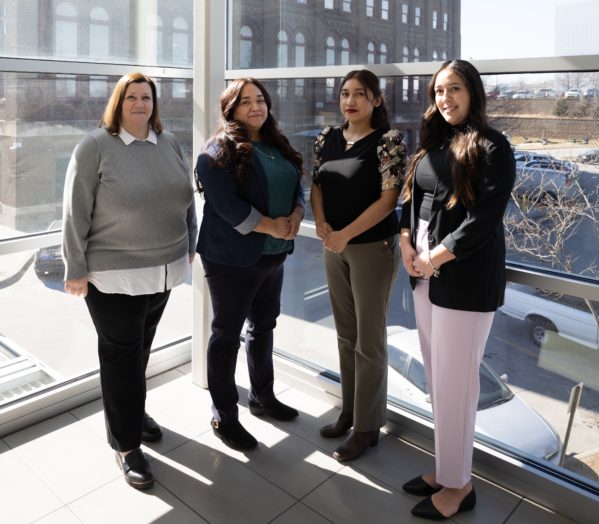Committing to health equity
OneWorld partners with Nebraska Medicine to increase access to colonoscopy screenings

OneWorld staff partnered with Nebraska Medicine to help patients receive colonoscopy screenings.
In 2021, OneWorld, in partnership with Nebraska Medicine, launched a program to help uninsured patients receive colonoscopies for no cost. That year, the program helped six individuals.
Two short years later, the program has helped over 100 uninsured patients, equating to over $1 million in savings for patients.
“One of the main barriers to getting a colonoscopy for uninsured patients is cost,” said Jennifer Mayhew, Chief Administrative Officer. “Without insurance, these screenings can cost upwards of $8,000 out of pocket.”
Mayhew said in addition to cost, there is hesitancy to be screened because of the possibility of finding something cancerous or that would otherwise require further treatment.
“We don’t only want to screen people for cancer, we want there to be resources to use if there is a diagnosis,” said Mayhew.
The development of this program began in 2019, when OneWorld leadership met with leaders of Bellevue Medical Center, including Robert Taylor, MD, General Surgeon, to discuss providing colonoscopies for patients at no cost.
Once the details of the program were finalized, the next step was to identify patients for the program.
Aside from requiring patients to be uninsured, Susana Reyes Sanchez, Associate Director of Operations, said OneWorld targets patients who are considered high risk due to family history of cancer and patients who have positive fecal occult blood tests.
OneWorld staff provide case management for all program participants, and serve as the liaison between OneWorld and Nebraska Medicine to help overcome language barriers, coordinate transportation as needed, confirm patients’ finances are aligned and other communication pieces with the medical teams.
With the idea to continue increasing access, Quan Ly, MD, Surgical Oncologist at Nebraska Medicine, reached out to OneWorld in 2021. Mayhew said Dr. Ly has played a large role in the expansion of the colonoscopy program, helping add Nebraska Medicine’s main campus as another location for patients to get their screenings.
“Dr. Ly helped us take the data we have along with our challenges and successes to advocate for this service to expand,” said Mayhew. “By adding the main campus, this program can grow because the campus is bigger and has more capacity.”
In addition to not worrying about cost, patients in this program are able to get their screenings completed within 1-2 months on average.
Across Nebraska, there are a limited number of gastrointestinal physicians. This has resulted in wait lists that are at least nine months long for services including colonoscopy screenings.
“Our program removes that availability barrier,” said Reyes Sanchez. “We are able to be very timely, and this is great for many reasons. One of those being if there is a cancer diagnosis, the sooner it is detected, the better.”
Out of the over 100 colonoscopies performed, polyps (growths on the inside of the colon lining) have been the most common discovery. These growths are removable, and when removed, help decrease an individual’s risk for colon cancer.
Mayhew said one patient has received a colon cancer diagnosis, but because the patient was a part of the colonoscopy program, they were able to transition them quickly from diagnosis to establishing oncology care at Nebraska Medicine.
Colonoscopy screenings are recommended every 10 years after the age of 45 on average, however if a patient’s colonoscopy screening yields abnormal results, they can be referred for screening that is more frequent.
Patients who participate in the OneWorld and Nebraska Medicine colonoscopy-screening program are eligible for more than one screening to ensure they have access to this critical service.
“There is a lot of desire for continuity in studies,” said Mayhew. “Not only do patients know what to expect and what physicians they will work with, but all of their records are kept in one place, which is a huge benefit for the patient and medical team.”
Reyes Sanchez said since this program began, OneWorld is seeing greater completion rates for colonoscopies, especially among Hispanic males.
“In the past, this was a struggle to get patients in for their colonoscopies, but we are completing more and that is a great indicator that our patients trust us and are seeing the importance of these screenings.”
As the program continues to grow, Mayhew said she is looking forward to watching the momentum change for the better as the understanding of the importance of these screenings and willingness to get these screenings done increases amongst the populations OneWorld serves.
“This program got started because of Dr. Taylor’s desire to provide these services at no cost, Nebraska Medicine’s willingness to be partners in health equity and OneWorld’s commitment to increasing access to care,” said Mayhew. “There have been so many individuals involved in this program, there is not enough thanks to go around.”




